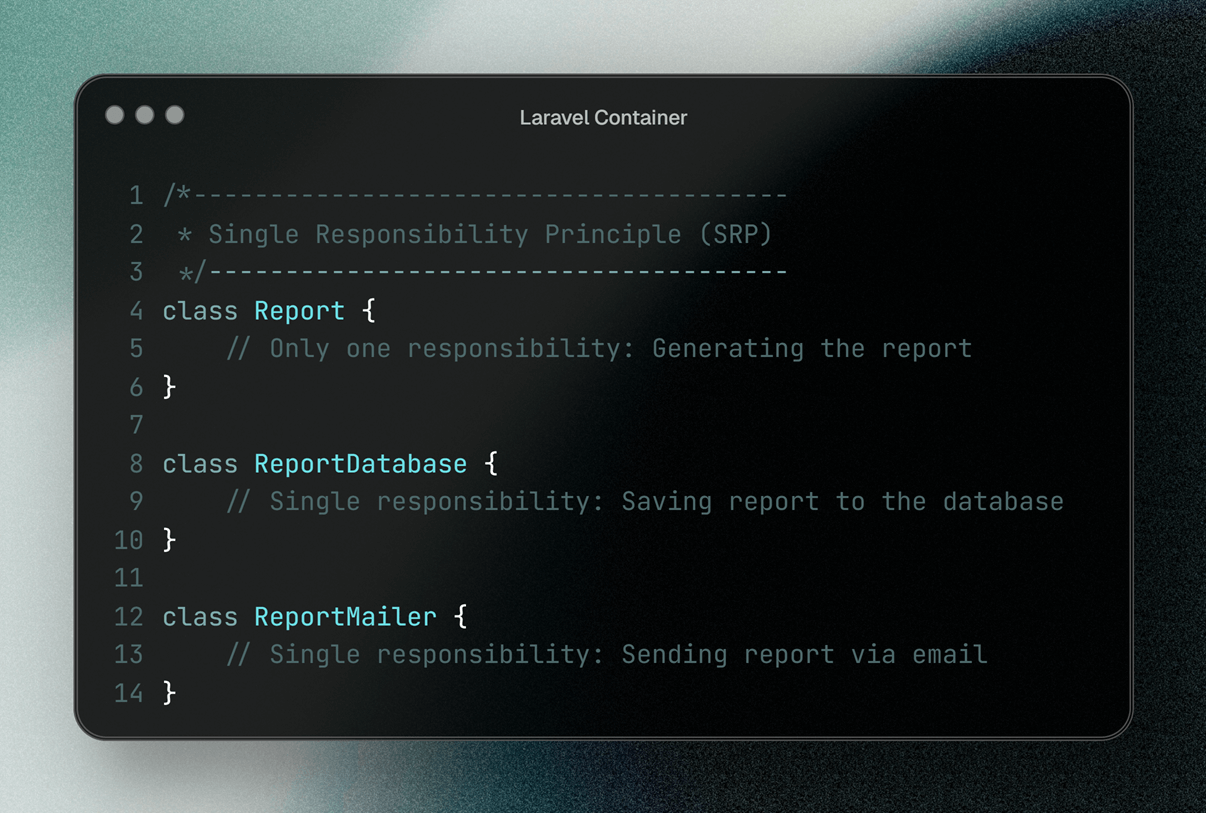Hey there, artisans! 😄 Today, we’re going to talk about one of the key ideas in programming called the Single Responsibility Principle (SRP), which is part of a set of principles known as SOLID. These principles are like a set of guidelines to help you write better and more maintainable code.
So, What’s SOLID? 🤔
SOLID is an acronym that stands for:
- S – Single Responsibility Principle (SRP)
- O – Open/Closed Principle
- L – Liskov Substitution Principle
- I – Interface Segregation Principle
- D – Dependency Inversion Principle
Today, we’ll focus on the S – Single Responsibility Principle (SRP), which says that a class should have only one reason to change. This simply means that a class should only have one job to do. If you give it too many jobs, it becomes confusing, hard to maintain, and harder to fix if something goes wrong.
Why is SRP Important? 🚀
Imagine you’re trying to manage a big project. If you have one person trying to do everything—organize meetings, answer emails, write reports, and handle accounting—they’ll get overwhelmed, and things will start slipping through the cracks. But if each person focuses on just one task, the whole project runs more smoothly.
In the same way, SRP helps to keep code clean and easy to manage. If a class is only responsible for one thing, you can change, improve, or fix that part without breaking other areas of your code. Cool, right? 😎
Let’s Look at an Example in PHP 📜
class Report {
private $data;
public function __construct($data) {
$this->data = $data;
}
// Bad: This class is doing too many things
public function generateReport() {
echo "Generating report...\n";
}
public function saveToDatabase() {
echo "Saving report to database...\n";
}
public function sendEmail() {
echo "Sending report via email...\n";
}
}
In the example above, the Report class is doing three things:
- Generating the report
- Saving the report to the database
- Sending the report via email
Each of these is a separate responsibility, but they’re all crammed into the Report class. If something goes wrong with the database or email system, you’d have to change the Report class in multiple places. That’s not ideal! 😕
Good Code – Following SRP ✅
Now, let’s fix it by following SRP:
class Report {
private $data;
public function __construct($data) {
$this->data = $data;
}
// Only one responsibility: Generating the report
public function generateReport() {
echo "Generating report...\n";
}
}
class ReportDatabase {
// Single responsibility: Saving report to the database
public function saveToDatabase(Report $report) {
echo "Saving report to database...\n";
}
}
class ReportMailer {
// Single responsibility: Sending report via email
public function sendEmail(Report $report) {
echo "Sending report via email...\n";
}
}
In the improved code:
- The
Reportclass only generates the report. - The
ReportDatabaseclass is responsible for saving the report to the database. - The
ReportMailerclass is responsible for sending the report via email.
Now, each class has one reason to change—just one responsibility. This makes it easier to test, modify, and maintain the code. You can find really beautiful examples of solid principle and design patterns in the Laravel framework. It’s architecture of different elements like service container and query builders are great examples for doing study and learning solid design patterns.
Conclusion 🌟
The Single Responsibility Principle (SRP) is all about keeping things simple and focused. By making sure each class has only one job, you avoid a lot of confusion and make your code easier to maintain and extend. It’s like a well-organized team where each member knows exactly what they need to do, and no one is overwhelmed by too many tasks.
So next time you write code, try to think: What’s the one responsibility this class should have? And stick to it. Your future self will thank you! 😄👩💻👨💻


Leave a Reply